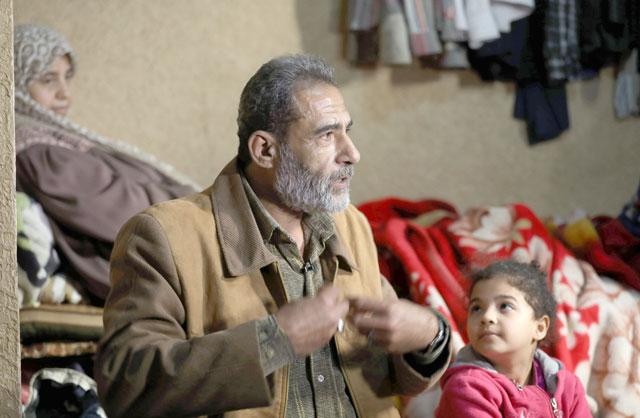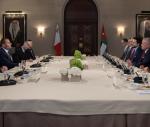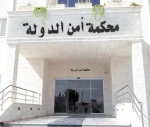You are here
Syria refugees test Palestinian solidarity in Lebanon
By AFP - Jan 09,2017 - Last updated at Jan 09,2017

Palestinian Fuad Abu Khaled, who fled Syria’s war with his family, speaks during an interview in his house in the Shatila Palestinian refugee camp, on the southern outskirts of the Lebanese capital Beirut, on Saturday (AFP photo)
BEIRUT — When Palestinian Fuad Abu Khaled fled Syria's war in 2013, he sought refuge among his own, looking for solidarity among Palestinian refugees based in Lebanon's Shatila camp.
But instead he found a community already struggling to get by and sometimes resentful of new arrivals who are testing the limited resources of the UN agency dedicated to helping Palestinian refugees.
"Despite the fact he's Palestinian and I'm Palestinian, I'm Syrian and he's from Lebanon," said Abu Khaled, who fled the Yarmuk camp in Damascus with his family after fighting began there.
"He sees you as coming to take his place, exploit him, take his daily rations," he told AFP at the camp in southern Beirut notorious for violence in the past.
Abu Khaled is one of at least 31,000 Palestinians who have taken refuge in Lebanon since Syria's conflict began in March 2011, part of a larger influx of some 1 million refugees from Syria.
And Lebanon was already home to about 450,000 Palestinian refugees, mostly the descendants of those who fled their homes when the state of Israel was created in 1948, or during subsequent conflicts.
Seated on a thin mattress in the one-bedroomed flat he shares with his wife and eight children, Abu Khaled said he simply couldn't make ends meet.
Fighting in Syria destroyed the 52-year-old's grocery shop, and the aid he receives from the UN agency for Palestinian refugees UNRWA and other charity groups has proved insufficient.
"I think if the situation continues like this the people could explode," he said.
In another part of the camp, Najah Awad sits in a modest room where she has lived with her three children since fleeing Yarmuk in 2013.
In the beginning "they welcomed us. But not any more," she said. "Now they see us as taking their jobs, taking their livelihoods."
UNRWA Syria's Director Matthias Schmale acknowledged the struggles faced by Palestinian refugees from Syria, as well as those in Lebanon hosting them.
"The longer this displacement from Syria lasts and the more pressures grow on UNRWA and indeed the host population of Palestine refugees from Lebanon, I think we cannot rule out tensions," he said in English.
But he stressed Palestinian refugees in Lebanon had displayed impressive generosity under difficult circumstances, sharing resources and in some cases even hosting Syrian Palestinians.
"It takes a lot of solidarity if you yourself live below the poverty line," he told AFP.
Some 5 million Palestinian refugees in Lebanon, Jordan, Syria, the West Bank and Gaza are registered to receive help from UNRWA, which was created after Israel's creation.
The organisation is frequently underfunded, but has come under new pressure with the conflict in Syria, where some 410,000 Palestinians now depend entirely on UNRWA handouts.
In response, the agency launched a $410 million (390 million euro) emergency funding appeal on Monday.
For Palestinians in Lebanon, including those coming from Syria, the hardships are exacerbated by tight restrictions on their ability to work.
Surviving on half needs
Abu Khaled is breeding canaries, hoping to sell the noisy chicks squeaking in a cage in his living room for up to $30 (28 euros) each.
His wife is still recovering from a hernia operation. While UNRWA paid half the hospital bill, he struggled to raise the rest of the money.
Some 90 per cent of Palestinian refugees from Syria in Lebanon live under the poverty line, a 2016 study by UNRWA and the American University in Beirut found.
Nine percent cannot meet even their basic food requirements.
Najwa Hazeneh, a Palestinian from Yarmuk who works with charities in the camp, said some families have only 50 per cent of their needs.
"They might cover that by going into debt, and usually they go without lots of things. Some people go without medical treatment. The mother becomes the doctor of the family. Sometimes they go without certain foods."
Abu Khaled said he knew people struggling to meet their most basic needs.
"It's a catastrophe for those forced to flee. A family in a good situation gets two meals a day. An average one gets one. I know some that get none," he said.
Despite the hardships, Mohammed Abu Ali of Fatah Al Intifada, one of several Palestinian armed factions that control Shatila camp, said Lebanese Palestinians were committed to helping their brethren.
"We share everything. We can't have them being in the dark while we have electricity, or them not having water while we do," he said, sitting in military fatigues under a Palestinian flag at his office.
"We hope UNRWA sees that they need to help us both."
Related Articles
A food convoy gained entry Thursday to Syria's besieged Yarmuk Palestinian refugee camp, where dozens have died from shortages of food and medicines, the UN and Syrian state media said.
DAMASCUS — More than 20 per cent of Syria's Palestinian refugees have fled the country and its five-year war, the head of the UN Palestinian
YARMUK, Syria — After years of fighting, crippling siege and bombardment, what was once the Palestinian diaspora’s largest urban settlement















